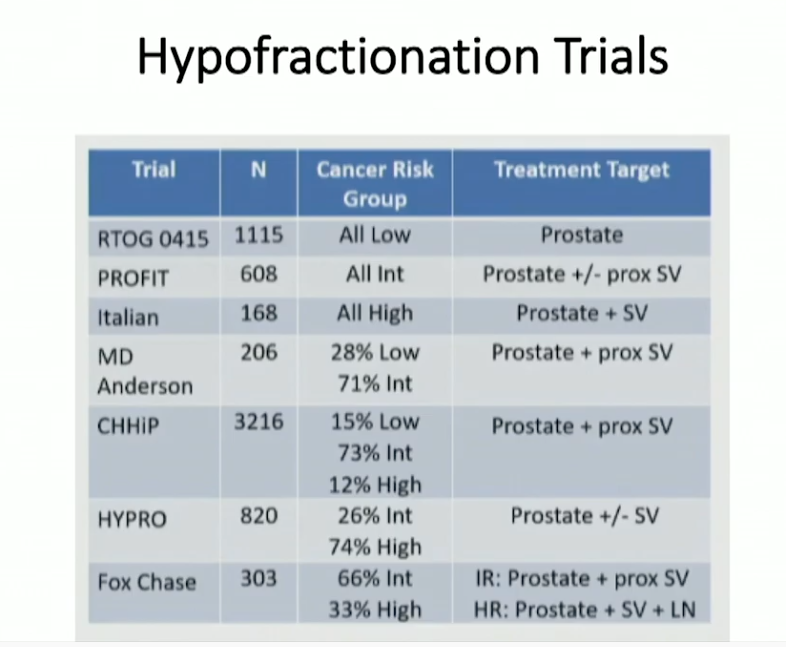David C. Beyer, MD, presented “Next Generation Updates: Advances in Radiation Oncology: Prostate Cancer” during the 28th Annual Perspectives in Urology: Point Counterpoint on November 16, 2019 in Scottsdale, Arizona.
How to cite: Beyer, David C. “Next Generation Updates: Advances in Radiation Oncology: Prostate Cancer” November 16, 2019. Accessed Dec 2024. https://dev.grandroundsinurology.com/next-generation-updates-advances-in-radiation-oncology-prostate-cancer/
Next Generation Updates: Advances in Radiation Oncology: Prostate Cancer – Summary:
David C. Beyer, MD, outlines the latest advancements and evolving data surrounding the use of radiation therapy for prostate cancer. He focuses on fractionation schedules, the merits of salvage versus adjuvant therapy post-prostatectomy, and the role of androgen deprivation therapy in salvage therapy.
Abstract:
Extensive evidence has shown that radiation dose escalation improves prostate cancer biochemical control. Historically, radiation oncologists have given daily fractionated doses of 1.8-2.0 Gy in order to reduce the risk of late toxicities. To deliver a higher amount of radiation given these dose parameters, the treatment period for these patients has steadily increased over the years from 6½ weeks to 9 weeks or more. However, previously-held assumptions regarding the radiobiology of prostate cancer have recently come under question, which could introduce the possibility of hypofractionated daily doses.
There is a multitude of data examining hypofractionation. A noninferiority trial demonstrated that a hypofractionated schedule and a conventionally fractionated schedule were indistinguishable in terms of disease-free survival results. The CHHiP trial also found that hypofractionated radiotherapy was non-inferior compared to conventional radiotherapy, though the toxicity reports revealed that hypofractionation can lead to earlier and greater gastrointestinal acute toxicities.
Reflecting these studies alongside a wider body of evidence, guidelines recommended offering hypofractionation to low-risk, intermediate-risk, and node-negative high-risk patients, but also counseling these patients on the gastrointestinal toxicity risks.
Other updates in the field of radiation oncology include evolving data, such as that from RTOG 0938, supporting the use of stereotactic body radiation therapy (SBRT) for prostate cancer. In the post-prostatectomy salvage setting, a secondary analysis of the RTOG 9601 trial suggested that pre-salvage radiotherapy PSA levels could be prognostic and predictive of benefit from salvage hormone therapy. Also, recent data supports the idea that select patients may be more appropriate for salvage rather than adjuvant therapy.
About Perspectives in Urology: Point Counterpoint
Perspectives in Urology: Point Counterpoint (PCP)is an annual, multi-day, CME-accredited conference devoted to discussing and debating the latest topics in men’s health and general urology, as well as management of bladder, renal, and both localized and advanced prostate cancer. More than didactic lectures, the conference’s format includes debates, point-counterpoint discussion panels, and unique case-based presentations. Dr. Beyer presented this lecture during the 28th PCP in 2019. Please visit this page in order to register for future PCP meetings.
ABOUT THE AUTHOR
Dr. Beyer is the Medical Director of Radiation Oncology at the Centers of Northern Arizona Healthcare in Sedona. He grew up in Phoenix and earned his medical degree from the University of Arizona College of Medicine after studying electrical engineering at the Massachusetts Institute of Technology in Boston. He completed consecutive residencies in both Internal Medicine and Radiation Oncology at the University of Arizona Health Sciences Center and the University of California, Los Angeles. He then went on to practice in Phoenix and Scottsdale from 1985-2014. He is board-certified in both Radiation Oncology and Internal Medicine.
While in private practice, he has published more than 40 peer reviewed articles on cancer treatments, guideline development, and health policy, with an emphasis on prostate cancer. He has advised Medicare on policy as a member of the MedCAC and has been actively involved in cancer care policy development throughout the past decade of healthcare reform.
Dr. Beyer has served as President for the American Society for Radiation Oncology, the American Brachytherapy Society, and the Arizona Radiologic Society. He has also served on the Council Steering Committee of the American College of Radiology and the Board of Chancellors for the American College of Radiation Oncology. He is a Governor-appointed member of the Arizona Medical Board.


